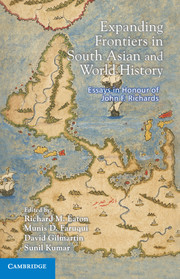Book contents
- Frontmatter
- Contents
- List of Contributors
- Foreword
- Introduction
- 1 At Empire's End: The Nizam, Hyderabad and Eighteenth-century India
- 2 The Ignored Elites: Turks, Mongols and a Persian Secretarial Class in the Early Delhi Sultanate
- 3 ‘Silk Road, Cotton Road or … Indo-Chinese Trade in Pre-European Times’
- 4 The Political Economy of Opium Smuggling in Early Nineteenth Century India: Leakage or Resistance?
- 5 Opium and the Company: Maritime Trade and Imperial Finances on Java, 1684–1796
- 6 The Mughals, the Sufi Shaikhs and the Formation of the Akbari Dispensation
- 7 Notes on Political Thought in Medieval and Early Modern South India
- 8 Becoming Turk the Rajput Way: Conversion and Identity in an Indian Warrior Narrative
- 9 Nature and Nurture on Imperial China's Frontiers
- 10 The Frontiers of Memory: What the Marathas Remembered of Vijayanagara
- 11 ‘Kiss My Foot,’ Said the King: Firearms, Diplomacy and the Battle for Raichur, 1520
- 12 Frontiers of Family Life: Early Modern Atlantic and Indian Ocean Worlds
- 13 Chinese Revenue Farms and Borders in Southeast Asia
- Publications
- Index
7 - Notes on Political Thought in Medieval and Early Modern South India
Published online by Cambridge University Press: 05 January 2014
- Frontmatter
- Contents
- List of Contributors
- Foreword
- Introduction
- 1 At Empire's End: The Nizam, Hyderabad and Eighteenth-century India
- 2 The Ignored Elites: Turks, Mongols and a Persian Secretarial Class in the Early Delhi Sultanate
- 3 ‘Silk Road, Cotton Road or … Indo-Chinese Trade in Pre-European Times’
- 4 The Political Economy of Opium Smuggling in Early Nineteenth Century India: Leakage or Resistance?
- 5 Opium and the Company: Maritime Trade and Imperial Finances on Java, 1684–1796
- 6 The Mughals, the Sufi Shaikhs and the Formation of the Akbari Dispensation
- 7 Notes on Political Thought in Medieval and Early Modern South India
- 8 Becoming Turk the Rajput Way: Conversion and Identity in an Indian Warrior Narrative
- 9 Nature and Nurture on Imperial China's Frontiers
- 10 The Frontiers of Memory: What the Marathas Remembered of Vijayanagara
- 11 ‘Kiss My Foot,’ Said the King: Firearms, Diplomacy and the Battle for Raichur, 1520
- 12 Frontiers of Family Life: Early Modern Atlantic and Indian Ocean Worlds
- 13 Chinese Revenue Farms and Borders in Southeast Asia
- Publications
- Index
Summary
In these days, when we don't have any kingdoms worth the name, texts on statecraft are of no use for ruling the state, and they are useful only for historians of shāstra texts.
—Veturi Prabhakara SastriThis country has seen the conflict between ecclesiastical law and secular law long before Europeans sought to challenge the authority of the Pope. Kautilya's Arthashastra lays down the foundation of secular law. In India unfortunately ecclesiastical law triumphed over secular law. In my opinion this was the one of the greatest disasters in the country.
—B. R. AmbedkarINTRODUCTION
Past works on the nature and content of state-building in medieval South India have focused largely on the inscriptional corpus, and a limited set of narrative accounts, in order to support classic formulations of such ideas as the ‘segmentary state’ and ‘ritual kingship’. In this essay, we return to some of the questions raised by our colleagues and predecessors in the field, but with a view to looking at ideological and ideational issues far more than concrete institutional arrangements. We should note at the outset that the specter of a perpetually receding horizon of universal concepts—those that can be used with equal confidence, say, for the analysis of pre-1800 societies in Europe, Asia and Africa—has taken something of a toll in recent decades. Is it at all legitimate to assume that ‘money’ existed in all or even most of these continents? What of the ‘economy’ itself, or even ‘society’?
- Type
- Chapter
- Information
- Expanding Frontiers in South Asian and World HistoryEssays in Honour of John F. Richards, pp. 164 - 199Publisher: Cambridge University PressPrint publication year: 2013
- 1
- Cited by



